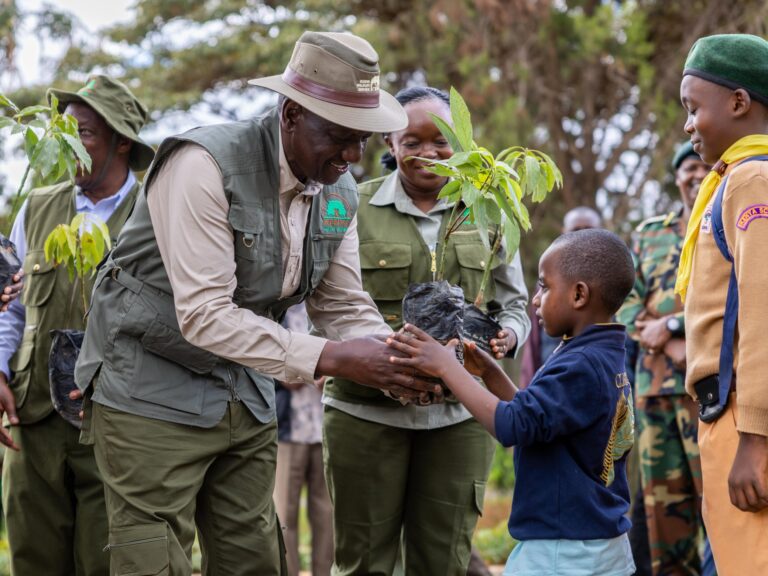
A Maasai woman in Narok County tills her land after winning a land dispute case with the support of FIDA Kenya. Photo/Courtesy
By Daisy Okiring
“A woman is like a tea bag—you can’t tell how strong she is until you put her in hot water.” These words by former U.S. First Lady Eleanor Roosevelt strike a chord in Kenya, where millions of women have long worked the land without owning it.
Despite contributing over 75 percent of Kenya’s agricultural labor, women hold title deeds to only 1.6 percent of the land individually, and just 5.6 percent jointly with men, according to the Kenya Land Alliance.
In stark contrast, men account for nearly 89.7 percent of all land registered in Kenya. These figures paint a troubling picture for a country whose 2010 Constitution guarantees equal property rights for all citizens, regardless of gender.
This pattern is not unique to Kenya. Across sub-Saharan Africa, women produce approximately 80 percent of the continent’s food, yet they own just 13 percent of the land. Inheritance traditions, patriarchal norms, and slow legal enforcement have created a system that marginalizes women from economic independence, leaving them vulnerable to poverty and food insecurity.
Yet amid this disparity, change is taking place.
Custom versus constitution
In many Kenyan communities, land ownership follows patrilineal traditions. Men inherit and register land, while women access it only through marriage or male relatives. The situation becomes precarious in cases of widowhood or divorce, where women often lose access to land overnight.
The Constitution of Kenya, enacted in 2010, sought to remedy this. It enshrines gender equality in property ownership and succession. The Land Registration Act of 2012 and the Matrimonial Property Act of 2013 further bolster women’s rights, including the requirement for spousal consent in property transactions. However, as legal scholar Dr. Esther Obonyo notes, “Laws alone cannot change mindsets. Implementation remains our biggest challenge.”
Read more: IMLU: Protect women human rights defenders and survivors of violence
Indeed, many women remain unaware of their land rights, and even those who are informed face bureaucratic hurdles, costly legal procedures, and resistance from local authorities.
Real stories, real struggles
In Narok County, 38-year-old Nasieku’s life turned upside down after her husband passed away. “His brothers came and said I had to leave the land. They told me I was just a guest,” she recounts. With support from FIDA Kenya, she fought a protracted legal battle and eventually secured her land title.
Now, Nasieku runs a successful onion farm and employs seasonal workers. “This land is my strength. I feed my children and earn enough to send them to school. No one can chase me away again.”

Such stories are increasingly common. Organizations like GROOTS Kenya and the Kenya Women Land Rights Consortium have stepped in with mobile legal clinics, paralegal support, and land registration drives. Their efforts have helped over 20,000 women across counties like Kisumu, Kitui, and Kakamega obtain title deeds or reclaim inherited land.
Why land ownership matters
Land is not just a plot of earth—it’s a gateway to credit, shelter, education, and political voice. The World Bank notes that women with secure land rights are more likely to invest in agriculture, contribute to household well-being, and escape poverty. They are also less susceptible to domestic violence and social exclusion.
Read more: Western Kenya prepares for second Magical Kenya Mountain Run
A 2021 UN Women report emphasized that land ownership leads to better child nutrition, higher school attendance, and reduced gender-based violence. In communities where women own land, local economies become more stable and resilient.
“When a woman owns land, she doesn’t just grow food—she grows futures,” says Njoki Mwarabu of the Kenya Women’s Land Rights Consortium. “It shifts the power dynamics.”
A glance across Africa
Kenya is not alone in this struggle. In Rwanda, a 2005 law mandated joint land ownership for married couples, and today over 80 percent of land is jointly titled. Ethiopia’s land certification program has issued nearly 7 million certificates, with over one-third going to women. These countries show that progress is possible with political will, community engagement, and accessible legal systems.

But elsewhere, progress is slower. In Nigeria, only 10 percent of women own land. In Malawi, women account for less than 12 percent of documented landholders. Cultural resistance, illiteracy, and lack of awareness continue to obstruct reforms.
Seeds of change in Kenya
Despite obstacles, Kenyan women are increasingly reclaiming their rights. In Makueni, widows have formed land advocacy groups to pressure county offices into recognizing their claims. In Turkana, women’s cooperatives have transformed communal lands into income-generating aloe vera plantations. And in Kisii, Mama Atieno, once landless, now trains others on how to navigate the land registry system.
“I didn’t know I could own land,” she says. “Now I teach my daughters and neighbors. We are changing things.”
The Kenyan government, too, has taken steps. The National Land Commission now requires gender-disaggregated data for all land transactions. County land boards must include at least one-third female membership. These initiatives, though small, signal a shift toward accountability.
Conclusion: The path forward
The fight for women’s land rights in Kenya is far from over, but it is no longer invisible. From the courtrooms of Nairobi to the furrows of rural fields, women are standing up and stepping forward.
Experts agree that the next frontier involves mass awareness campaigns, faster legal procedures, and continuous community engagement. Schools, churches, chiefs, and local leaders must be brought into the conversation. Above all, women themselves must be empowered to speak, demand, and act.
Read more:Miraa, morality & money: Culture clash in Kenya’s chewing crop
As Eleanor Roosevelt said, women’s strength often reveals itself in adversity. Kenyan women have been tested by tradition and law, by silence and exclusion. And yet, they endure. They rise. And with every title deed they secure, they reclaim not just land—but history, dignity, and the promise of equality.




1 thought on “Breaking barriers as women own land in Kenya”
Comments are closed.